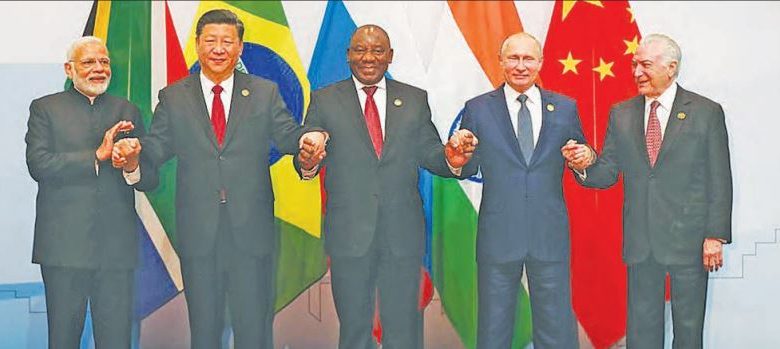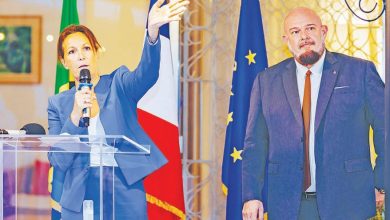Multipolar word demands new African strategy for win-win benefits

AFRICA: AFRICAN nations have since independence operated within a global system they did not participate in designing, one that often undermines their agency and development.
The African nation-states continue to battle internal governance issues, corruption and conflicts.
The post Second World War liberal international order built on principles of market capitalism, secular individualism and democracy were presented to the continent not as an optional framework but as a singular dogmatic path to legitimacy and development.
The unfolding geopolitical shift towards a multipolar world calls for Africa to step out of its traditional role as a passive adapter and become an active creator of its own political, economic and cultural future.
Shortcomings of the Liberal Order in Africa
The liberal world order imposed on Africa assumed dogmatic one-size-fits-all ideals. What was originally supposed to be a competitive, adaptable school of thought took on a messianic evangelical momentum with little regard for local context and traditions.
It fuelled erosion of trust as Africa was relegated to a supplier of raw materials and remained marginally connected to global trade at only 4 per cent even though it’s home to 17 per cent of the global population.
The forced adoption executed through mechanisms such as the Structural Adjustment Programmes (SAPS) of the 1980s that imposed strict liberalisation policies to enforce privatisation, austerity and market deregulation.
Governments were confronted with political conditionalities to access aid and investments from Western capitals.
The African communitarian and consensus-oriented approach was frowned upon.
European and American farmers receive billions in subsidies, but African farmers and local industries are expected to compete fairly, ceding significant economic sovereignty to international financial institutions and foreign actors.
Its young people are fleeing in search of opportunities abroad, natural resources shipped out raw, only to be imported as finished products.
The liberal order in practice remained illiberal for Africa as Western markets remained protected, international financial system facilitated illicit financial flows from the continent.
The International Monetary Fund and World Bank voting structures systematically marginalise Africa. Africa failed to instrumentalise the liberal order to its own context to become competitive globally.
Instrumentalisation of the liberal international order
China’s success story stands out as a country that significantly instrumentalised liberal international order to its own advantage. China opted to use tools of the liberal order to further its own national goals and rejecting dogmatic and incompatible elements.
It leveraged the access to markets through the World Trade Organisation in 2001 to enter the vast European and United States of America markets thereby powering its manufacturing sector.
China welcomed massive inflows of foreign direct investment, using cheap labour and later its domestic market as a bargaining tool.
China strategically integrated itself at the centre of the global supply chains and ensured internal stability by rejecting political and ideological elements of the liberal play book.
China literally diverged from elements of the liberal model that prescribed privatisation and deregulation and instead focused on a dominant role of the stateowned enterprises with a oneparty system under the Communist Party of China.
China has since become the main competitor of the liberal order by promoting state-centric, managed markets system and civilisation state centred political system.
Africa should draw pragmatic lessons from China’s ability to blend state leadership with global market integration to harness over 3,000 thriving ethnic national identities on the continent.
The G20, multipolarity and new governance initiatives
A multipolar world is characterised by decentralised power among several nation-state actors, competing centres of influence including the place of liberal international order and civilisational state-led initiatives and complex shifting alliances.
The Group of Twenty (G20), currently under the South African presidency, is viewed as a product of shifting international order, an indirect accelerator and manager of the transition towards a multipolar world.
It is an international forum comprising the world’s largest developing and developed economies established to tackle pressing global economic and financial issues.
ALSO READ: New tax strategy launched to raise domestic revenue
It accounts for 85 per cent of global GDP; 75 per cent International Trade and two thirds of Global population.
It is a platform that legitimises the role of new power centres and emerging economies such as China, India, Brazil, Indonesia, South Africa and Saudi Arabia among others.
The G20, works within the foundational frameworks of the USA and West led international rules order and the global economic framework that retains the US dollar reserve currency status, the SWIFT payment system.
A coalition of emerging economies in the Global South led by China are driving multipolarity through the BRICS formation that accounts for 41 per cent of global GDP.
BRICS formation is pushing for the trade and transaction by use of nondollar currencies among member states; a review of global trade and financial architecture and focus on infrastructure development.
The formation elevated South Africa’s international status at the global stage as a pioneer member. BRICS frame themselves as counterpoint to western led economic governance and promote a distributed decision-making mechanism to one that encompasses voices of countries in the Global South.
BRICS efforts found a major boost from Asian countries in the just concluded Shanghai Cooperation Organisation, that called for a Global Governance Initiative to be driven by sovereign equality, upholding international law under the United Nations Charter, multilateralism based on consultation and consensus, people centred approach to ensure benefits for populations and tangible cooperation in financial investments, energy, infrastructure and artificial intelligence.
BRICS suffers from critical internal complexities. It does not have a monolithic ideology and is characterised by divergent models that range from state-capitalism as in China and Russia, democracies as in India, Brazil and South Africa and economic rivalry that will force Africa to navigate a delicate balancing act.
The rivalry between two leading members, China and India might play out and create orbits of influence thereby sustaining Africa in its current fragmented state.
The framework for a strategic reset
Africa must adopt a multipronged framework that addresses internal reform and external engagement.
The future lies in reclaiming agency through collective bargaining, leveraging the Africa Continental Free Trade Area as a strategic tool to mandate percentage of valueadded to exports to shape the continent’s place in the global order.
It must adopt a pragmatic instrumentalisation of the best from competing liberalism and civilisation state-led models by leveraging financial markets and long-term planning beyond political cycles.
Internally, the continent has onerous task of overcoming institutional weaknesses fed by patronage networks and weak legislature to embracing principles such as transparent public procurement and independent judicial systems.
The continent must invest in governance dividends to address corruption as a critical economic systems failure not just a moral challenge.
It must invest in the youthful populations through linking curricula to dynamic market demands.
Accelerate resource beneficiation laws as outlined by the AfCFTA that promote value addition on the continent.
Africa’s path to agency lies not in rejecting global systems, but in mastering them, blending internal reform with strategic external engagement to chart its own future.
Acknowledging the 54 nation-states and a mosaic of thousands of cultures, Africa’s strategic path must operate at multiple levels that bolster continental frameworks, allowing flexible coalitions of aligned interests, regional economic blocs and readiness to engage different poles of the multipolar world.
● The writer is the Founder Director Inter Region Economic Network (IREN Kenya) and Publisher of the African Executive Weekly james@irenkenya.com





